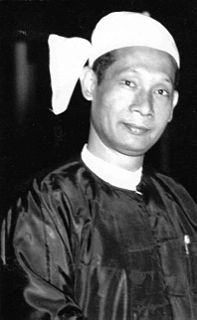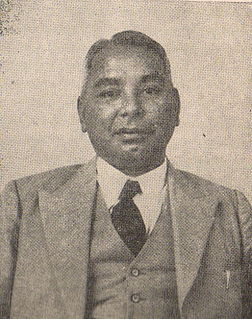
Bogyoke Aung San served as the 5th Premier of the British Crown Colony of Burma from 1946 to 1947. Initially he was a communist and later a social democratic politician. He was known as a revolutionary, nationalist, and as the founder of the Tatmadaw, and is considered the Father of the Nation of modern-day Myanmar. He was one of the founders of the Communist Party of Burma.
U Saw, also known as Galon U Saw, was a leading Burmese politician and the Prime Minister of British Burma during the colonial era before the Second World War. He is also known for his role in the assassination of Burma's national hero Aung San and other independence leaders in July 1947, only months before Burma gained independence from Britain in January 1948. He was executed by hanging for this assassination.

University of Yangon, located in Kamayut, Yangon, is the oldest university in Myanmar's modern education system and the best known university in Myanmar. The university offers mainly undergraduate and postgraduate degrees programs in liberal arts, sciences and law. Full-time bachelor's degrees were not offered at the university's main campus after the student protests of 1996. The bachelor's degree was re-offered from 2014 on, to the best students in the country. Today degrees in Political Science are offered to undergraduate students, as well as Postgraduate diplomas in areas such as social work and geology.

Ba Swe was the second Premier of Burma. He was a leading Burmese politician during the decade after the country gained its independence from Britain in 1948. He held the position of prime minister from 12 June 1956 to 28 February 1957. When Ba Swe became prime minister, Time magazine reported the news in an article titled: 'The Day of the Tiger' based on his nickname 'Big Tiger' since his university days in the 1930s as a student leader.
Martyrs' Day is a Burmese national holiday observed on 19 July to commemorate Gen. Aung San and seven other leaders of the pre-independence interim government, and one bodyguard —Thakin Mya, Ba Cho, Abdul Razak, Ba Win, Mahn Ba Khaing, Sao San Tun, Ohn Maung and Ko Htwe—all of whom were assassinated on that day in 1947. It is customary for high-ranking government officials to visit the Martyrs' Mausoleum in Yangon in the morning of that day to pay respects.

Maung Maung was the 7th President of the Union of Myanmar, and a well-known writer.
The Panglong Conference, held in February 1947, was an historic meeting that took place at Panglong in the Shan States in Burma between the Shan, Kachin and Chin ethnic minority leaders and Aung San, head of the interim Burmese government. Aung Zan Wai, Pe Khin, Bo Hmu Aung, Sir Maung Gyi, Dr. Sein Mya Maung and Myoma U Than Kywe were among the negotiators of the historical Panglong Conference negotiated with Bamar representative General Aung San and other ethnic leaders in 1947. All these leaders unanimously decided to join the Union of Burma. On the agenda was the united struggle for independence from Britain and the future of Burma after independence as a unified republic.

The Ministry of Education is the Myanmar government agency responsible for education in Myanmar.

Thein Sein is a Burmese politician and retired general in the Myanmar Army who served as the 8th President of Myanmar from 2011 to 2016. He previously served as Prime Minister from 2007 to 2011, and is considered by many in and outside Myanmar as a moderate and reformist in the post-junta government.

The Burma Workers Party, until 1958 the Burma Workers and Peasants Party, was a communist party in Burma, formed on 8 December 1950, by leftist elements of the Socialist Party. In December 1962 it merged with the People's Comrade Party to form the United Workers Party. In March 1964, it was among the many parties banned by decree of the Revolutionary Council.
Maung Maung Ta was a Burmese actor and politician.
Pe Khin was the most important negotiator and architect of the historical Panglong treaty in Burma. Even General Aung San was disappointed, given up and decided to take the flight back to Rangoon that evening. Pe Khin persuaded General Aung San to stay for one night and to allow him to negotiate with the Ethnic Minority leaders. Pe Khin successfully negotiated with those Ethnic leaders and U Aung Zan Wai, Bo Khin Maung Galay, U Pe Khin, Bo Hmu Aung, Sir Maung Gyi, Dr. Sein Mya Maung, Myoma U Than Kywe to get an agreement for this most important treaty in Burma, which was the foundation of the formation of Union of Burma which leads to its Independence from the British. This day of February 12 is celebrated since as 'Union Day'.
Thakin Kyaw Tun, or Thakin Kyaw Dun was a Burmese politician.
The Right Honourable U Kyaw Nyein was a Burmese politician.

Sir Joseph Augustus Maung Gyi was a Burmese barrister, judge, diplomat, politician and administrator who served as the Acting Governor of British Burma during the tenure of Charles Alexander Innes, who was away on sick leave in the United Kingdom. He had served variously cabinet minister such as Minister of Forestry, Minister of Home Affairs, Minister of Education and Public Health during the colonial era.

The Commander-in-Chief of Defence Services is the commanding officer of the Tatmadaw, the armed forces of Myanmar.














